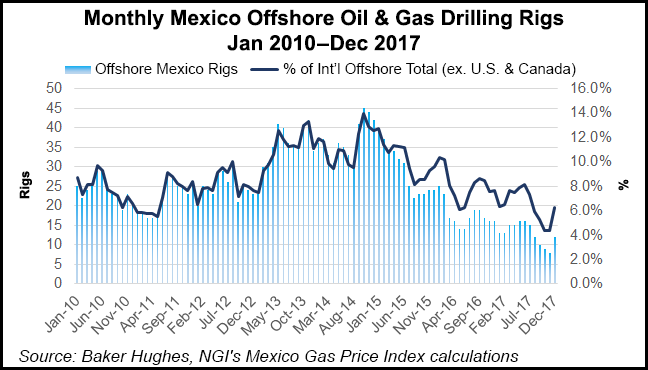Shell Hits the Ball Out of the Park in Mexico’s Key Round 2.4 Upstream Auction
Royal Dutch Shell plc was the clear winner Wednesday in the fourth auction of Round Two of Mexico’s 2013-14 energy reform, where it snapped up nine of the 29 mostly oil-focused offshore blocks on offer.

In total, 19 contracts were awarded to 11 companies from 10 different countries. Bidders committed to drilling 23 exploration wells and $525 million was committed in cash bonus payments, which when bids are finalized would go into the Mexico Sovereign Oil Fund.
Shell was already going great guns in the early stages of the Round 2.4 bidding as it was screened live Wednesday in public transmissions on the Internet and on television.
The European-based supermajor won five of nine contracts in the Perdido Fold Belt region in the deepwater Gulf of Mexico (GOM) just across the maritime border from some of the major discoveries of recent years in U.S. waters.
In four of the five blocks, Shell won in consortium with state-owned Qatar Petroleum (QP), and one in conjunction with Mexico’s state-owned Petroleos Mexicanos (Pemex). The only other block in Perdido that was taken went to Pemex alone.
There were no takers for the other three Perdido blocks.
Four of the 10 areas received bids in the Cordilleras Mexicanas area, known in English as the Mexican Ridges. The area is located off the coast of the southern Gulf state of Veracruz.
The winners were Spain’s Repsol SA in block 10 in consortium with PC Carigali — the moniker of Malaysia’s Petronas — and UK-based Ophir Energy plc. Repsol also took Block 14, this time only with PC Carigali.
Block 12 went to PC Carigali, Ophir and Thailand’s PTT Exploration and Production Public Company Ltd. (PTTEP). Block 18 went to Pemex on its own. Shell was outbid on two blocks, while six of the 10 Ridges blocks received no bids.
The third and final region is the pre-salt Salina Basin, where Shell returned to its winning ways, taking blocks 20 and 21, as well as 23 and 28.
Block 22 went to Chevron Corp., Pemex and Japan’s Inpex Corp. Italy’s Eni SpA, QP and PC Carigali took 24, while PC Cargali took blocks 25 and 26 on its own. Repsol, PC Carigali, Sierra Oil & Gas as Sierra Nevada and PTTEP took the final block, 29.
Analysts reflected optimism about Mexico’s upstream potential ahead of Wednesday’s auction.
Despite decades of exploration and production by Pemex, about 20 billion boe is still to be discovered on and offshore the nation’s Gulf of Mexico region, said Sierra Oil CEO Ivan Sandrea. He spoke at a business forum on the eve of the 2.4 auction.
“There are more than 250 structures that can become oilfields in the future. This is a major exploration objective,” Sandrea said.
In the twilight months of the current Mexican administration, officials are stepping up the pace of the upstream auctions.
The election to choose a successor to President Enrique Pena Nieto is due in July, and the inauguration of the nation’s next leader is scheduled for December.
Despite the inevitable political uncertainty of the coming months, Deputy Energy Secretary Aldo Flores said earlier this week the 2.4 auction would be followed by a 3.2 round in June and yet another before the end of the year.
CNH President Juan Carlos Zepeda explained, in an interview with the daily El Financiero, the system that was introduced to resolve tie-breaks in the bidding for 2.4.
“In the United States, the royalty is fixed, at 12.5% in waters of less than 200 meters in depth, and 18.5% at depths that are greater,” Zepeda said. “In Mexico, the starting point is 14.3%, but there’s an additional royalty that is open to competitive bidding and it begins at a minimum of 5% but can go on to a maximum of 29.3%.”
The system has been devised by the Finance ministry, which sets the economic terms of the upstream auctions under the terms of the 2013-14 energy reform, the first after nearly 75 years of state monopoly.
© 2024 Natural Gas Intelligence. All rights reserved.
ISSN © 2577-9877 | ISSN © 2577-9966 |
